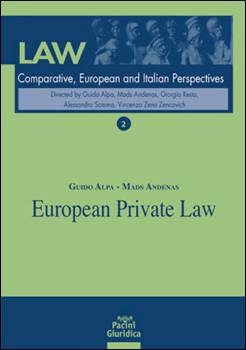European Private Law - SCONTO 5% -
- Editore
- Pacini Editore
- Autori
- Guido Alpa - Mads Andenas
- Categoria
- Diritto
- Collana
- LAW - Comparative, European and Italian Perspectives
- Pagine
- 400
- Pubblicato
- Settembre 2022
- Codice ISBN
- 9788833795027
- Prezzo di listino
- €
35,00 - a Voi riservato
- € 33,25
Descrizione
Unlike other handbooks on European private law, which focus mainly on describing the effects of the sources of EU law in the legal systems of the Member States, this work sets out to lay the foundations for understanding the process of the formation of a European private law.
It illustrates its significance by starting from its original conception in the 1930s, with the historians’ studies on the modern idea of Europe and the role that law could play in the preservation of peace, cooperation between peoples and the construction of a common market.
The European legal identity arises from the way the law is understood, how it is interpreted and applied, but also on the cultural basis of the jurist’s training.
Then the book examines the general principles of law and the main institutes of civil law : persons and fundamental rights, contracts, civil liability, in the coordination of the different sources of law and in the realisation of a multilevel protection of rights.
The legal analysis is always accompanied by historical and economic perspectives, following the example of Paolo Grossi, whose ‘Message of Law to Europe’ is the reader’s guide.

